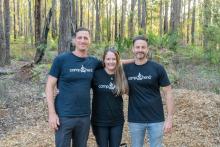

Chevron Australia director of operations Danny Woodall says Australia is in an international race for investment, as the company reviews its global operating model.
In a speech to the Energy Club of WA on Tuesday night, Mr Woodall highlighted Chevron Australia’s position in the market and the need to keep investing in facility improvements and additional offshore fields.
He highlighted the Geyron and Eurytion fields, which Chevron has applied for approvals to connect back to the Gorgon project on Barrow Island, as examples of work Chevron plans to carry out in Australia.
But after Woodside Energy chief executive Meg O’Neill again hit out at the regulatory environment in Australia, Mr Woodall flagged similar jurisdictional pulls from abroad in the competition for investment dollars.
“That investment is not guaranteed,” he said of the spending required in Chevron’s existing fields and new deposits.
“When we look to the US, which is now the world’s largest producer of LNG, the business-friendly policies of the Trump administration are likely to result in increasing competition for market share as well as investment dollars.
“That’s because companies invest in locations where it’s easier to do business and where returns are more certain.
“Chevron, with development opportunities across the globe including here in Western Australia, is no different.
The fight for capital is on, and it will be won by the countries that offer the most attractive and stable fiscal and regulatory settings.”
Mr Woodall said investors expected Chevron to compete responsibly and competitively in a global market, and that the company was working to evolve its ways of doing business around the world.
“So, like many others in our sector, we’re reviewing our operating model across the world as well as here in Australia,” he said.
“We have a strong foundation to build on, but we need to sharpen our focus and make changes to the way we work.
“As part of this process, we’re seeking to leverage our strengths, standardise what we can, and centralise where it makes sense to become more efficient and deliver more consistent results.”
Technology will be a key part of that task.
Mr Woodall said Chevron had already implemented digital twins of its Gorgon and Wheatstone assets, was leveraging drones for maintenance, using remote operations, and exploring AI as a potential tool – and demand driver.
At Gorgon, it is advancing the Jansz-Io compression project to maximise gas supply from the namesake gas field off Barrow Island.
“Installation of the offshore infrastructure has started, and fabrication continues, with Western Australian companies and workers playing a significant role in completing this multi-billion-dollar project,” Mr Woodall said.
Chevron is also planning exploration and appraisal wells at Dino South 1 and Wheatstone deep this year.
The Wheatstone asset will become even more part of Chevron under an asset swap deal with Woodside, in which the former will grow its stake to 77 per cent from 65 per cent.
It will also take on a 65 per cent managed stake in the Julimar Brunello field, which is planned for processing through Wheatstone.
“Further, increasing our equity stake in Wheatstone positions us to unlock future value by enabling long-term asset development and monetisation,” Mr Woodall said.
Chevron is the operator of the Gorgon carbon capture project, which it pioneered and continues to work to optimise.
Gorgon CCS hasn’t operated to nameplate capacity since it briefly hit the mark shortly after launch in 2019.
The company had promised 4 million tonnes per annum of carbon dioxide capacity but has consistently fallen short of that mark.
Chevron said 10.5Mt had now been stored at Gorgon CCS since the project’s launch.
In addressing CCS and the broader energy conversation, Mr Woodall said there was a need for rational and sensible dialogue – highlighting that many of the technologies required for net zero were yet to be fully developed.
“These challenges are real, and overcoming them requires us to have a better, more pragmatic conversation about energy,” he said.
“One that recognises the importance of balancing energy security, economic prosperity and environmental protection. A conversation based on facts and real-world, practical experience, not on ideology and sensationalism.
“Where we can acknowledge that there are trade-offs that have to be made without being accused of abandoning global climate ambitions. And where all perspectives can be heard, not just those who shout the loudest.
“Australia’s energy security and economic prosperity is far too important for partisan politics or to be treated as an activist punching bag.”
Chevron announced long-serving Australian boss Mark Hatfield would retire on Tuesday, with Balaji Krishnamurthy moving from Houston to Perth to take up the role as president of Australian operations.














